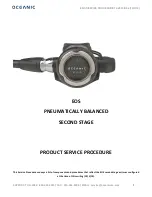
81
Appendix F – Troubleshooting Guide
Problem
Possible Solutions
1
Laser turret spinning
and A-1519/1520 target
not detecting laser
(target LED not
illuminated)
•
Power off laser and turn back on (all L-740 and L-730 series lasers have a
power protection circuit that needs to be reset if a power surge causes the
laser to turn off).
•
Turn off rotation of laser if the beam is OK and check target battery.
•
Check where beam is hitting target. If it hits too low, target will not turn
on.
2
Turret spinning; laser
beam not on
•
Power off laser and turn back on. If the laser does not power on, then it’s
possibly a blown laser diode. Return to HLI for repair.
3
Laser beam on; turret
not spinning
•
Ensure rotation switch is turned on.
•
Ensure rotation speed knob is turned up.
•
Check batteries – if the battery is low, there may not be enough voltage to
spin the turret, but the laser may still be visible.
•
Environment is too cold. Laser cannot be used below 32 degrees F (0
degrees C).
•
Belt drive may be broken. Return to HLI repair.
4
Laser not spinning and
no laser beam
•
Ensure power supply is connected.
•
Replace batteries in the battery pack.
•
Check power supply connector. Widen split in pin inside the female
connector on the laser with a small screwdriver.
•
Check A/C power source. Use second A/C power supply if available.
5
Noisy target
(A-1519/1520) readings
on PDA
Note:
On average the user can expect .00002in/ft to .00005 in/ft (0.0025
mm/m to 0.004 mm/m) of noise in good operating conditions.
•
Check for vibration in laser instrument stand (tripod) or surface the laser
is sitting on. If laser is mounted on a machine tool, try turning machine
tool off.
•
For very noisy readings, check for rotary lights (like on forklift) or strobe
lights (this will look like a “laser” to the target).
•
Check for air turbulence – air conditioning vents right over target? Check
for open doors in summer or winter. See manual for Atmospheric
Conditions.
•
Turn off the rotation of the laser and slowly rotate is by hand to check for
reflections from metal surfaces. Dim overhead lights if possible.
•
Check for excess background light (use light shields). A warning may pop
up on PDA display.
•
Ensure only one laser is hitting the target at a time. Turn off other laser
plane rotation to see if this helps.
•
Ensure the target is facing/pointing directly at the laser (within ± 5
degrees).
•
Check light frequency (50 Hz vs. 60 Hz for background light). For
correction feature of A-1519/1520 targets, see Target Utility Manual.
North & South America is 60 Hz. Europe, Australia and parts of Asia are
50 Hz.
•
If PDA is plugged in, try unplugging PDA from A/C adapter.
•
Check for possible radio interference.
Summary of Contents for STEALTH Series
Page 1: ......
Page 69: ...65 Appendix A Equipment Drawings L 733 Precision Geometry Laser...
Page 70: ...66 L 743 Ultra Precision Geometry Laser...
Page 71: ...67 A 1519 A 1520 Universal Wireless Targets...
Page 72: ...68...
Page 73: ...69...
Page 74: ...70...
Page 75: ...71...
Page 76: ...72...
















































